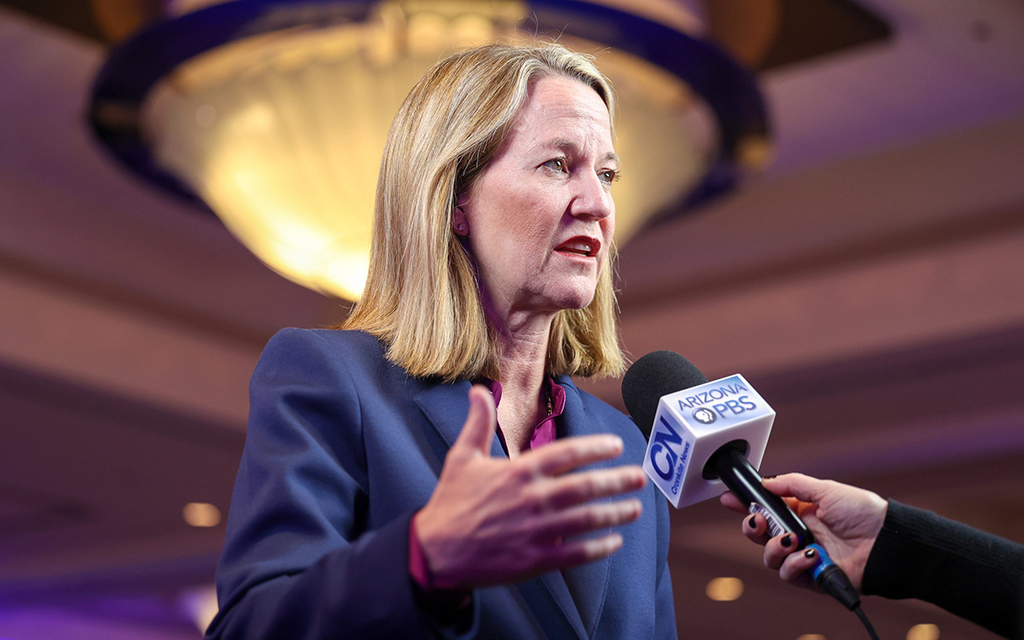
Arizona Attorney General Kris Mayes, who announced that Arizona joined the Department of Justice and 29 other states in suing Live Nation and Ticketmaster for anti-competitive business practices. (File photo by Mary Grace Grabill/Cronkite News)
WASHINGTON – Arizona concertgoers, long annoyed at the so-called “Ticketmaster tax,” saw a glimmer of relief after the state and the U.S. Department of Justice accused the companies that have access to the nation’s top venues of monopoly practices and pricing.
“I hate them. The fees are absolutely ridiculous,” said Khambrel Speer, a hairstylist from Chandler who goes through Ticketmaster to watch the Rattlers play indoor football at Desert Diamond Arena in Glendale.
An antitrust lawsuit filed Thursday by the Justice Department and joined by the District of Columbia and 29 states, including Arizona, alleges that Live Nation and its Ticketmaster subsidiary harmed consumers through a variety of inflated charges, including service fees, convenience fees, VIP fees and handling fees.
The lawsuit also accuses Live Nation of flexing monopoly power by signing venues to restrictive long-term contracts. According to the lawsuit, Live Nation owns or controls 60 of the top 100 amphitheaters nationwide. It also runs concert tours – for instance, Maren Morris is playing Arizona Financial, a Live Nation-owned building where Ticketmaster is the only ticket provider.
The lawsuit accuses the company of using its leverage with venues and artists to steer ticket sales to Ticketmaster. Major venues around the Valley use Ticketmaster as the primary ticketing app, including Arizona Financial Theatre in Phoenix, which is controlled by Live Nation.
Ticketmaster handles 75% of ticket sales to major concert venues nationwide, according to the Justice Department and the states.
“I … always use Ticketmaster,” said Lindsey Kearns, who attended Beyoncé’s concert at State Farm Arena last year.
But Kearns, 33, a counselor, would be happy to buy tickets elsewhere if she could.
“For years, Live Nation’s anti-competitive and monopolistic practices have resulted in Arizonans paying more to see their favorite artists than they otherwise would have,” Arizona Attorney General Kris Mayes said in a written statement. “The uncompetitive live entertainment market created by Live Nation has also left artists and venues without real any choice but to use Live Nation. This lack of competition hurts everyone, from fans to performers – and it’s time to hold Live Nation accountable for its violations of the law.”
Public pressure to see Live Nation investigated stems in part from a botched presale of tickets for the Taylor Swift Eras tour in November 2022. Live Nation eventually canceled the presale after Swifties struggled with long wait times and website crashes.
In the aftermath, the Senate Judiciary Committee summoned Live Nation for a hearing on its role in the ticketing industry.
The uproar did not result in any federal legislation, however.
In a written statement, Dan Wall, executive vice president for corporate and regulatory affairs at Live Nation, rejected the allegations leveled by the Justice Department and the states.
The antitrust lawsuit, he said, “blames concert promoters and ticketing companies—neither of which control ticket prices—for high ticket prices. It ignores everything that is actually responsible for higher ticket prices, from rising production costs to artist popularity, to 24/7 online ticket scalping that reveals the public’s willingness to pay far more than primary ticket prices.”
Wall called it “absurd to claim that Live Nation and Ticketmaster wield monopoly power. The defining feature of a monopolist is monopoly profits derived from monopoly pricing. Live Nation in no way fits the profile. Service charges on Ticketmaster are no higher than…on other primary ticketing sites, and are frequently lower.”
The Justice Department and the states are asking the court to prohibit Live Nation from engaging in anti-competitive practices that inhibit competitors from growing in the space because of the threat of retaliation from Live Nation. The Justice Department is also asking the court to order Live Nation to divest Ticketmaster, ensuring the same company doesn’t both control a venue and sell tickets to events there.
“I appreciate that they’re hopefully making the buying process fair and more organized,” said Kearns.
